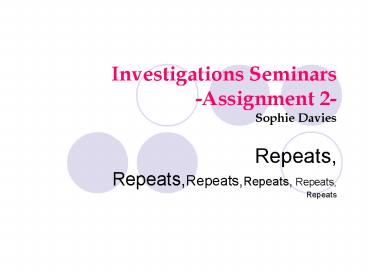Investigations Seminars Assignment 2 Sophie Davies
1 / 11
Title:
Investigations Seminars Assignment 2 Sophie Davies
Description:
We decided to look at one of the multiples more deeper to see if we could draw ... Question: What is the relationship between the cycle length of the unit fraction ... –
Number of Views:38
Avg rating:3.0/5.0
Title: Investigations Seminars Assignment 2 Sophie Davies
1
Investigations Seminars-Assignment 2-Sophie
Davies
- Repeats, Repeats,Repeats,Repeats, Repeats, Repeats
2
Focus Question
Focus Question
Focus Question
Unit fractions have a numerator of 1.
Investigate those unit fractions whose decimal
equivalents recur.
Focus Question
Focus Question
Focus Question
3
1
0.3
3333333333
3
1
0.142857 142857
7
Based on the examples given we could draw out
that although they were repetitive they were
repeating in different ways. Eg 1/3 was.333
repeater and 1/7 was repeating every six digits.
We then decided to see if there were any
patterns or relationships in the numbers between
1-10. Based on the answers we were able to draw
out that the multiples of three, all had repeated
numbers. Eg 1/11 ¼0.25 1/70.142857142857 ½
0.5 1/50.2 1/80.125 1/30.33 1/60.1666 1
/90.111 1/100.1
4
After we went from 1-10 we decided to see if by
going up higher in numbers whether this would
have an impact on the answers. It
did. 1/11.0909090 1/130.769230769 1/15.066666
6 1/12.0833333 1/14.0714285714 1/16.0625
1/17.0588235294 1/18.05555555
We decided to look at one of the multiples more
deeper to see if we could draw any conclusions
from the numbers it left after it. This is what
we could come up with 1/90.11111 1/9000.001
111 1/900.01111 190000.0001111 1/9000
00.000011111
5
Therefore, by how many zeros are after the single
digit is how many zeros are after the decimal
place. This is evident in all numbers. When we
did 1/6 the answer was 0.166666. We couldnt
work out why the number one was in front of the
6, because all other numbers tested just went on
to a zero then the digits after.
I then decided to test the same numbers by adding
the same number rather than a zero to see if
there were reoccurrences or patterns
evident. 1/11 1/110.090909 1/1110.009009 1/
11110.0009 1/111110.00009 There was
reoccurrence in the zeros and number nine. 1/11,
1/111 after the decimal place. There were still
the zeros, but they only increased as more digits
in the denominator were introduced. Eg 1/11111.
6
Question What is the relationship between the
cycle length of the unit fraction 1/mn and the
cycle lengths of 1/m and 1/n? Eg
1/98 1/9 1/8 1/98.0102040816 1/9.1111 1/8.12
5 1/270.037037 ½0.5 1/70.14 This was very
interesting as in 1/98 the answer was in a
pattern. If you look at the numbers other than
the zeros then you can see that the numbers are
doubling. Eg 1x22 2x24 4x28 8x216 The
second number was interesting because both 1/27
and 1/7 had a repetitive pattern. 1/27 was
repeating 037, 037. In 1/7 the answer could be
seen as just 7x2 so from these two there were
some patterns and repetition that were found.
7
Question Which Unit fractions have an even
number of digits in their recurring
cycles 1/15.066666 1/45.022222 1/750.01333
3 1/300.033333 1/600.016666 1/900.011111
By this I could see that these numbers were
going up by 15 every time and they all had even
numbers in the recurring cycle and were recurring.
8
Question Can you predict whether the decimal
expansion for a particular unit fraction will be
terminating or recurring?
½0.5 this is the same as 0.5000000 I could say
that ½0.5(0) This can also apply to every
terminating decimal. From this I could conclude
that all terminating fractions are just recurring
ones with a period of (0). 1/100.1, thus it
applies to all.
9
Prime Numbers Prime numbers are numbers that are
greater than 1 and are only divisible by
themselves and 1.
10
Prime numbers-in recurring cycles
1
1
1
0.142857..
0.1111..
0.090909..
7
11
9
Prime Number
1
0.0625..
Prime Number
1
0.027027
16
37
Is a recurring cycle and also has a pattern
Prime Number
Conclusion from this can be said that the
majority of prime numbers have a pattern, or a
recurring cycle.
11
- Summary
- Most multiples of 3 have a repetitive cycle
with that denominator in it. - By how many zeros you place after the denominator
can tell you how many zeros will be after the
decimal place. - All terminating fractions are just recurring ones
with a period of (0) - My PowerPoint presentation can be found on my
e-portfolio under Curriculum and Knowledge
because I found new knowledge from the processes
involved, and investigating processes is very
important for children to grasp as the majority
of the time the process is most important than
discovering the final answer. This is a bonus.






























![Accounting Assignment Help [Education in United States]](https://s3.amazonaws.com/images.powershow.com/8980731.th0.jpg?_=20180112048)
